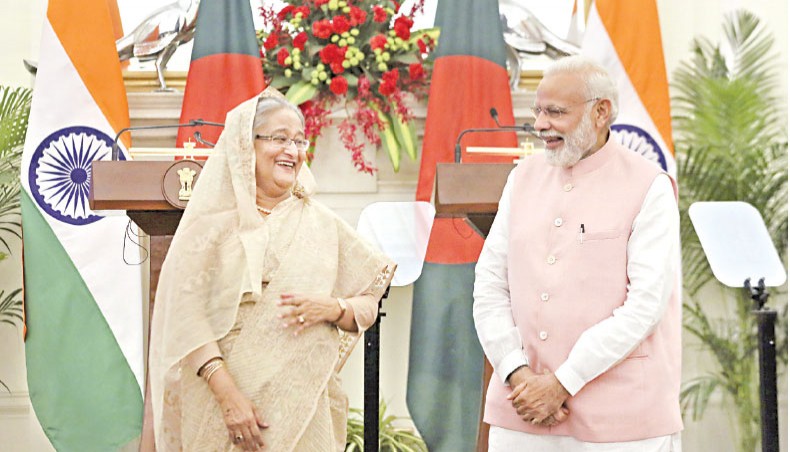Psychoanalysis of Indo-Bangla military deal
THE talk of a possible Bangladesh-India military deal has been in the air for some time now. Although the terms are never discussed in the parliament, newspaper reports revealed some of the aspects of the deal and I see it mostly as an offer of US$500 million line of credit to Bangladesh for the purchase of military hardware from India. Other aspects of military cooperation are often impractical, untrustworthy or less-binding. Countries often violate them or retreat when time calls for a real cooperation. Germany’s violation of nonaggression pact with Russia during the Second World War is worth mentioning. In June 1941, after two years of signing the pact, along the course of its successful military adventure through France and Poland, Germany invaded Russia, turning a non-warring party into a desperate foe.
I have read articles on newspapers where writers questioned the idea of buying weapons from a country which itself is one of the largest importer of military goods where Bangladesh can, and actually does buy them from China, another friendly nation who is a major arms manufacturer in the world. I agree with all of them, so without reiterating their concern, I will state another aspect of such financial deals with India, which is a psychological one.
In 2010, India gave Bangladesh $1 billion line of credit. With that money, Bangladesh is upgrading its transport network including rail tracks and ports mainly to facilitate India’s transit from its western part to the east. I noticed a very curious impact of the deal. Bangladeshi and Indian (and Pakistani, too) netizens (citizens active on the internet) every now and then engage in a row; usually in the comment sections of international news outlets and social media platforms, over issues ranging from a controversial umpire’s decision in a cricket match to killing of a Bangladeshi cattle trader or a farmer by Indian border security force. There I saw, Indian netizens often claim that Bangladesh is such a broke country that it can’t do without Indian ‘financial aid.’ I was astonished to see how a loan which would earn India some 1.75 percent interest along with the benefits of transit with negligible fee is dubbed an ‘aid.’ This is the upper hand India is gaining in a psychological war and it is totally compatible with its aspiration to attain an image of a superpower.
I’ll mention another psychological tactical manoeuvre that tries to psych out a Bangladeshi mind. During the discussion on the deal, some writers mention that Bangladesh is surrounded by India on three sides, indicating Bangladesh’s options are limited. Ironically, this exaggerated, if not baseless, idea comes from a certain quarter of my own countrymen. On the contrary, many military strategists say Bangladesh has almost divided India into two parts, since the northern stretch of India is mountainous and narrow, as low as 27 km at Siliguri corridor, also known as chicken’s neck. I saw a number of discussants in the Bharat Rakhsak Forum, often dubbed as a think-tank of Indian military issues, to be noticeably uncomfortable with this fact. They know, when a country raises its own armed forces with expenditure worth 1.2 per cent of its GDP, it does have a plan of active defense in case of an invasion. In case of such an uncalled for situation, Bangladeshi armed forces are thought to have a plan to disrupt transportation of military personnel and freight to seven sisters, the north eastern states of India.
A state is often seen as a rational actor. However, since foreign policy is made and implemented within an international and domestic political context, and states are run by often irrational humans, a state’s decision can be equally rash, short-sighted, and irrational from its people’s point of view. For example, India’s transit through Bangladesh with so little financial benefit as to Tk 192 per ton, while a core committee of Bangladesh tariff commission recommended charging Tk 1058, and a Bangladeshi trailer has to pay Tk 345 on Jatrabari-Gulistan flyover, may seem irrational. We have given so much without ensuring our transit to Nepal and Bhutan, and the rightful share of water from dozens of rivers on which India has constructed dozens of barrages to withdraw water unilaterally.
Ruling Awami League has reasons to be grateful to India, as the latter was the only country in the world to justify an uncontested election in 2014 with the absence of the main opposition party, BNP. India went as far as sending its then foreign secretary Sujatha Singh to Jatiya Party chairman Hussain Muhammad Ershad prior to the election to convince him to take part in the election so that, as Ershad revealed to the reporters the secretary to have said, BNP-Jamat cannot come to power. So, Awami League may choose to sign controversial deals to help its most crucial international supporter look essential in Bangladesh’s trade, energy, transport and military sector.
The apparent desperation on the Indian side to sign the deal is thought to have emanated from Bangladesh’s purchase of two submarines from China. These big boys in Chinese and Indian armed forces are always playing war games in their minds. They are not necessarily looking for real wars. Neither are we. It would be great if we did not take part in their games and go for big defense purchases. Bangladesh has achieved, among other things, higher life expectancy and lower infant mortality compared to India and Pakistan. Sex-selective abortion and female infanticide in China and India is so high that Bangladesh has become a positive role model for them. In fact, we are in the right track regarding people’s welfare, and will be doing great without big defense purchase and military deals.
- See more at: http://www.newagebd.net/article/13214/psychoanalysis-of-indo-bangla-military-deal#sthash.wDQhbvLi.dpuf











